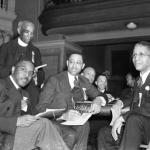• Apparently Rod Dreher’s blog at the American Conservative will be ending because it became “too weird” for the conservative multi-millionaire funding it:
That disgruntled read was Howard Ahmanson Jr., the heir to a California banking fortune and the sole benefactor of Dreher’s six-figure salary at TAC, which is published by American Ideas Institute, a nonprofit. This unique funding arrangement — a single donor choosing to cover one writer’s entire salary — was paired with an even more unusual editorial arrangement: Dreher was allowed to publish directly on TAC’s site without any revisions or legal oversight.
The name Ahmanson will be depressingly familiar to many of my friends in the world of institutional white evangelicalism where the family has long been an important, if not essential, benefactor.

Those friends will also be familiar with what Dreher is now experiencing — the realization that this philanthropy is always conditional and contingent. That can be a problem when your operating budget becomes dependent on the good favor of an ultra-wealtby individual who also happens to be a big fan of Neo-Confederate goofball nonsense like the Theonomist Chalcedon Foundation.
• The recent excitement over a potential revival-like-experience unfolding at Asbury College last month reminded me of the last time I’d seen such Could This, At Long Last, Be The Revival We’ve Been Waiting For? enthusiasm. That was the outpouring of religious enthusiasm and spiritual renewal that seemed to be taking place at Urbana 15.
But whatever revival might have begun there was quickly squelched as InterVarsity began furiously backpedaling, insisting that none of the repentance and renewal pledged by thousands of young people at that event would be allowed to become meaningful or lasting. I wrote about that here, “InterVarsity takes a firehose to Pentecost in a rush to quench the spirit” and here, “Toddlers on a treadmill: Why evangelicals can’t even take baby steps toward justice” without ever specifically mentioning the name “Ahmanson.” But I was thinking it.
InterVarsity retracted its revival, apologizing for having allowed it to occur, in an official statement that seemed written, as a I wrote back then, “based on the assumption that the reader is a white Christian. More specifically, it was written based on the assumption that every possible and imaginable reader of this statement would be a white Christian who fears Black people.”
This wasn’t some hypothetical, generic white Christian who fears black people. It was a particular, actual group of Black-people-fearing white Christians capable of writing and/or withholding enormous checks.
Unlike InterVarsity, Asbury isn’t dependent on the conditional generosity of Rushdoony disciples, but the problem here isn’t limited to particular donors and particular institutions. It has to do, rather, with the way that white evangelicalism’s understanding of “revival” and “renewal” has been shaped, bounded, and limited by what those donors will and will not allow. (If you think “allow” is too strong a word, go re-watch Michelle Higgins’ sermon at Urbana 15, then re-read InterVarsity’s groveling, sniveling apology for it.)
• One of the best summaries of the Asbury Revival that I’ve read comes from Captain Cassidy McGillicuddy at OnlySky: “Why evangelicals got so excited about the Asbury Revival.”
McGillicuddy is an atheist now, but she grew up Pentecostal and she remembers the experience of revival — the desperate longing for it and the overwhelming sense of its arrival. And she does a good job explaining this (often sympathetically) for non-religious readers viewing all of this from the outside.
She explains the deep evangelical desire for a new Great Awakening — a sweeping, nationwide revival that results in mass conversions and huge growth in church attendance. Alas, “Most often, the burst of activity does not result in a lot of conversions at all. Instead, it just gets existing evangelicals very excited. They call these a renewal, a blessing, or a refreshing (or sometimes even an outpouring) since that’s how their participants feel.”
I suspect McGillicuddy is right that the main consequence of the Asbury Revival/Renewing/Outpouring will likely be to “shore up the faith of a few Gen Z evangelicals.” Some individuals’ lives will be individually changed, some in big ways, some in small.
Of her own experience of revivals, she writes:
At the time, I thought only Jesus could possibly have made that feeling—that environment—possible. Since then, I’ve felt that way in many other situations, all of them completely non-Christian. And I’ve learned that many cultures and religions have their own ways of letting loose that look strikingly similar.
… But as a fundamentalist teenager, wow, it was impossible for me to imagine a revival being purely earthly in nature. It just seemed impossible that humans could work themselves up to that level of excitement.
I understood revival the same way when I was younger and I also later learned that the same feeling and sensation could be experienced in very different contexts. It turned out that same exhilarating, spine-tingling, heart-thumping, goose-bumping inspiration could also be found, for example, via the “heart-stopping, pants-dropping, house-rocking, earth-quaking, booty-shaking, love-making, legendary E-Street Band.”
But that led me to the opposite conclusion that McGillicuddy reached. I take that as evidence that the spirit, presence, and grace of God are not confined to official church events and church buildings. As Merton and Mr. Rogers and Buechner taught us, an overwhelming encounter with divine grace was something that might sneak up on us anywhere. Clack-clack.
RNS reports that “The Asbury revival is over. What happens now?” Well, somebody — or a bunch of somebodies — is trying to replicate and reproduce and franchise it, but from the looks of the mostly empty arena they rented that’s not going as hoped. Students at the college are heading back to classes and a Planet-Fitness-in-February vibe will soon settle in.
Helen Jin Kim asks some good questions here:
So, why have Asbury revivals, in particular, garnered so much attention from mainstream media, social media, and Christian broadcasting? As a historian and scholar of religion, I am not interested in weighing in on the authenticity of revivals. I know from my own upbringing and intellectual training, we have to take participants’ experiences into account, whether or not we agree with their explanations of their experiences. But, as a scholar, I am interested in the impact such events have on society. What is being revived at these gatherings? Would media outlets know to look for revivals in Latinx immigrant contexts like my colleague’s? If they witnessed revivals in Asian and Asian American contexts, would they consider it newsworthy?
• The Frederick Buechner quote in the title of this post is also from Daniel Amos’ Buechnerific “(What’s Come) Over Me,” which is what happens when Terry Taylor reads The Alphabet of Grace after listening to A Hard Day’s Night.













